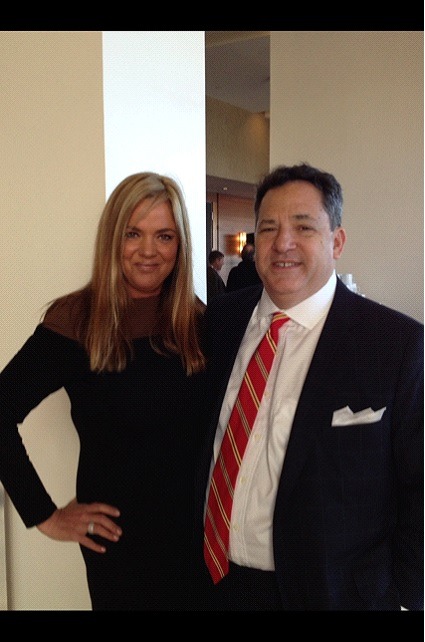At last week’s Jacobs Summit, I explained the intricate, highly researched, scientific formula that determines how we book our guests and craft our sessions. Here it is:
If we think we can learn something, we figure it will be beneficial for you.
And that’s why we have always brought in professionals from industries outside of radio or people who are often outsiders in the radio business. And the formula continues to work well.
Our much-quoted CEO panel featuring Jeff Warshaw, Mary Quass, Steve Wexler, and Craig Jacobus produced the expected revelations, emotion, and energy that you don’t typically see at other conferences that pack the stage with “the usual suspects.”
 And our other sessions were loaded with gems, lightning bolts, and a zinger or two from our special guests. One of those was Dateline NBC’s Josh Mankiewicz (left with Lori Lewis), a network guy who thinks about his celebrity in a much different, more personal way. He is a Twitter savant, spending considerable time every day monitoring his feed, and personally staying in touch with fans and followers. When asked how he finds the time to keep tabs on Twitter amidst his other responsibilities, Josh actually struggled for an answer.
And our other sessions were loaded with gems, lightning bolts, and a zinger or two from our special guests. One of those was Dateline NBC’s Josh Mankiewicz (left with Lori Lewis), a network guy who thinks about his celebrity in a much different, more personal way. He is a Twitter savant, spending considerable time every day monitoring his feed, and personally staying in touch with fans and followers. When asked how he finds the time to keep tabs on Twitter amidst his other responsibilities, Josh actually struggled for an answer.
That’s because his philosophy of serving one fan at a time is innate. He reads their tweets, he considers them, and he responds. Because that’s what you do when you’re a celebrity and you’re afforded this amazing opportunity to connect with viewers in a genuine, very real way.
And his secret behind effectively using Twitter? Three words:
“Speed, humor, and snark.”
It’s not rocket science. It’s basic.
Josh isn’t setting appointments or promoting himself as so many media personalities do on Twitter.
He is authentically mixing it up with his audience.
And while no one knows that weird elixir of elements that make for great ratings in radio or TV – and Josh is the first person to tell you that – Dateline NBC’s ratings are up, and so is the activity on Twitter.
In the previous session, Vh1 President Tom Calderone spoke to the influence that Twitter has on him and his network of shows. Because through Twitter, he and his staff see early indicators of whether a show is hot – or not. And advertisers are taking notes, too. As Tom told a packed room at Baltimore’s beautiful Four Seasons, what’s trending on Twitter influences and impacts media buyers and planners.
So as we put a wrap on 2013 and think about where radio is headed economically (most say flat or down), and where it sits in the minds of consumers (I’ll let you be the judge), the ability to reach, impact, connect with, and grow your brand’s equity – whether you’re a station or a DJ – has never been better.
But you have to engage.
Most of the DJs, shows, and teams I know – whether in rock, sports, country, or public radio – are more than capable of speed, humor, and yes, a little snark.
The question is whether they’re willing to commit the time, the effort, and the energy to becoming a social brand in 2014.
- For Radio, Will It Be Christmas In April (And Hopefully, May)? - April 21, 2025
- Media And Technology In 2025: Believe It Or Not! - April 18, 2025
- In Radio, You Just Never Know - April 17, 2025




Leave a Reply